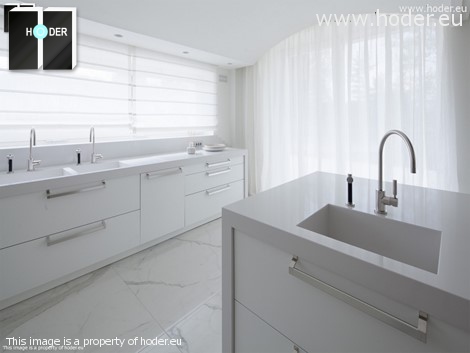CARING FOR CONGLOMERATE KITCHEN COUNTERTOPS

WE RESPECT YOUR PRIVACY
We use cookies to ensure the proper functioning of the website, and if you agree, also for marketing and advertising purposes. We use cookies in accordance with our Privacy Policy.
You can specify the conditions for storing or accessing cookies in your browser. The administrator of your data is Hoder Sp.k. More about more about storing cookies

Choosing the perfect kitchen countertop involves more than just aesthetic considerations; functionality plays a significant role too. While natural stones like marble and granite are popular choices, another option worth considering is the conglomerate countertop. But what makes this material unique, and how should one care for it?
UNDERSTANDING CONGLOMERATE COUNTERTOPS
Conglomerate offers an appealing alternative to natural stone. It's a composite of stone particles bound together, typically with epoxy resin. This combination results in an incredibly durable and resilient material. Plus, it's available in a vast array of colors. Depending on the type of stone used, conglomerates can resemble:
Marble,
Granite,
Quartz.
Its rise in popularity stems from its many advantages, including its lightweight nature. This means standard kitchen cabinetry can support its weight effortlessly. Moreover, its robust nature makes it resistant to mechanical damage, water, dirt, and common cleaning agents. It also doesn't absorb odors or moisture, making it ideal for kitchens.
KEY POINTS TO REMEMBER WITH CONGLOMERATE COUNTERTOPS?

Owners will undoubtedly value the benefits of a conglomerate countertop. Its ease of maintenance is a boon for those passionate about cooking. Moreover, the material's versatility allows for more creative designs and color choices. Another advantage is its ability to adapt to room temperatures, often feeling warmer than natural stone.
CLEANING YOUR CONGLOMERATE COUNTERTOP?
To maintain the conglomerate's properties, proper care is essential. Using appropriate products ensures that the countertop remains both functional and aesthetically pleasing for years.
Sealing the countertop helps to strengthen and close any naturally occurring pores in the stone. These tiny pores can absorb liquids, which can expedite wear and tear. Before sealing, always ensure the countertop is free from grease and grime. This treatment not only guards against stains or discolorations but also prevents damages and cracks.
For day-to-day cleaning, plain water is often sufficient. However, specialized products can polish and add a protective layer to the surface.
AVOID THESE WHEN CARING FOR YOUR CONGLOMERATE COUNTERTOP?
 |
Regardless of whether the countertop resembles marble, granite, or quartz, specific care precautions are essential. It's vital to avoid certain cleaning agents, including acidic solutions or sodium chlorides. Commonly used cleaning solutions, like dishwashing liquid, should be avoided. Even a small amount, when exposed to a hot container, can leave persistent marks.
Steer clear of harsh chemicals, including chlorine, bleach, and acetone. For those with marble-like conglomerates, vinegar and lemon juice are not recommended as they can potentially damage the surface. By adhering to these care guidelines, your conglomerate countertop will remain beautiful and functional for many years. Its initial investment is well justified by its longevity and performance. |